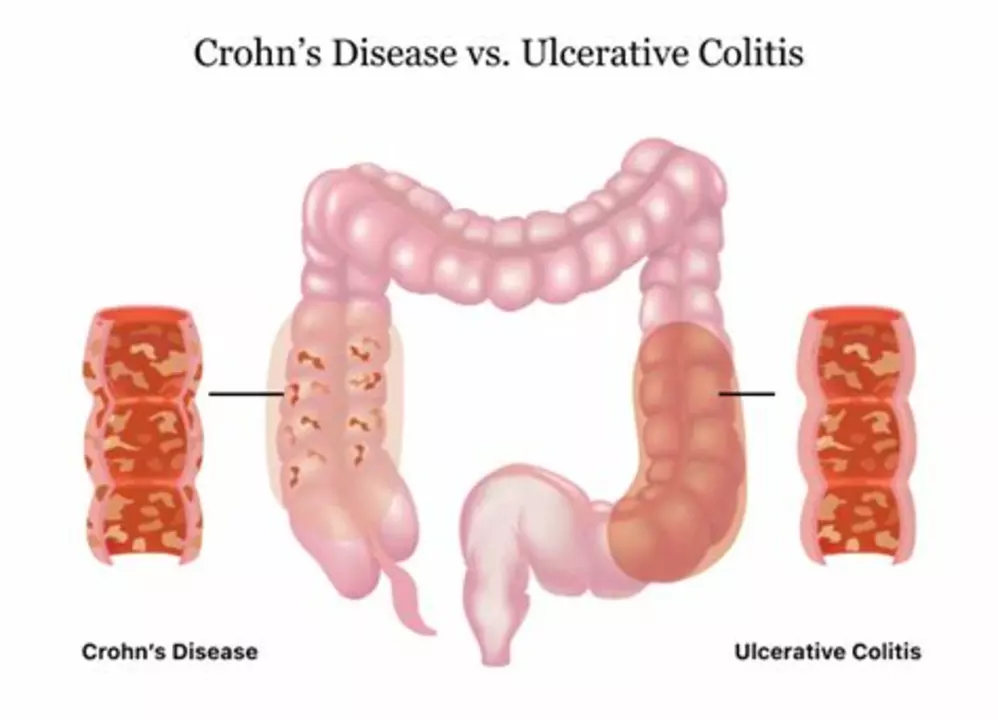Understanding Crohn's Disease and Heart Conditions
In this article, we will explore the connection between Crohn's disease and heart conditions. We will start by discussing what Crohn's disease is, and then dive into the various heart conditions that are linked to the disease. We will also discuss the causes of these connections, as well as the possible treatments that can help manage both Crohn's disease and associated heart conditions. So, let's get started!
What is Crohn's Disease?
Crohn's disease is a type of inflammatory bowel disease (IBD) that can affect any part of the gastrointestinal (GI) tract, from the mouth to the anus. It is a chronic condition that is characterized by periods of remission and flare-ups. The most common symptoms of Crohn's disease include abdominal pain, diarrhea, weight loss, and fatigue. The exact cause of Crohn's disease is still unknown, but it is believed to involve a combination of genetic, environmental, and immune factors.
Common Heart Conditions Linked to Crohn's Disease
There are several heart conditions that have been found to be linked to Crohn's disease. Some of these conditions include:
1. Pericarditis
Pericarditis is an inflammation of the pericardium, the thin sac-like membrane that surrounds the heart. It can be caused by various factors, including infections and autoimmune disorders like Crohn's disease. Pericarditis can cause chest pain, shortness of breath, and a rapid heartbeat.
2. Endocarditis
Endocarditis is an inflammation of the inner lining of the heart chambers and heart valves. It is usually caused by a bacterial infection, but can also occur as a result of Crohn's disease. Symptoms of endocarditis can include fever, chills, fatigue, and heart murmurs.
3. Myocarditis
Myocarditis is an inflammation of the heart muscle itself, which can weaken the heart and lead to heart failure. Myocarditis is rare in people with Crohn's disease, but it can occur as a complication of the disease. Symptoms of myocarditis can include chest pain, shortness of breath, and irregular heartbeats.
Causes of the Connection Between Crohn's Disease and Heart Conditions
There are several factors that can contribute to the connection between Crohn's disease and heart conditions. These include:
1. Inflammation
The chronic inflammation that occurs in Crohn's disease can affect not only the GI tract but also other parts of the body, including the heart. Inflammation can damage the heart muscle, the lining of the heart chambers, and the heart valves, leading to conditions like pericarditis, endocarditis, and myocarditis.
2. Autoimmune Response
Crohn's disease is an autoimmune disorder, which means that the body's immune system mistakenly attacks its own healthy tissues. This autoimmune response can also target the heart, causing inflammation and damage to the heart tissue.
3. Nutritional Deficiencies
People with Crohn's disease may have difficulty absorbing nutrients due to inflammation and damage in the GI tract. This can lead to nutritional deficiencies, which can affect the health of the heart and contribute to the development of heart conditions.
4. Medications
Some medications used to treat Crohn's disease, such as corticosteroids and immunosuppressants, can have side effects that can affect the heart. These medications can increase the risk of heart conditions in some individuals.
Treatments for Crohn's Disease and Heart Conditions
Managing both Crohn's disease and heart conditions can be challenging, but there are several treatment options available. These include:
1. Medications
Anti-inflammatory medications, such as corticosteroids and aminosalicylates, can help reduce inflammation in both the GI tract and the heart. Immunosuppressant medications, such as azathioprine and methotrexate, can help suppress the autoimmune response that contributes to both Crohn's disease and heart conditions.
2. Nutritional Support
Addressing nutritional deficiencies is crucial for maintaining overall health and managing both Crohn's disease and heart conditions. This may involve dietary modifications, vitamin and mineral supplements, and, in some cases, enteral or parenteral nutrition.
3. Surgery
In some cases, surgery may be necessary to treat complications of Crohn's disease or heart conditions. For example, if a person with Crohn's disease develops a bowel obstruction or a fistula, surgery may be required to remove the affected portion of the bowel. Similarly, if a person with Crohn's disease develops a severe heart condition, such as endocarditis or heart valve damage, surgery may be required to repair or replace the affected heart valve.
4. Lifestyle Modifications
Maintaining a healthy lifestyle is important for managing both Crohn's disease and heart conditions. This includes regular exercise, maintaining a healthy weight, eating a balanced diet, managing stress, and avoiding smoking and excessive alcohol consumption.
Conclusion
In conclusion, there is a clear connection between Crohn's disease and heart conditions. Understanding this connection and being aware of the potential risks is crucial for people living with Crohn's disease. By working closely with your healthcare team and making appropriate lifestyle and treatment choices, you can effectively manage both your Crohn's disease and any associated heart conditions.







Aly Neumeister
May 27, 2023 AT 15:27I've actually known someone who was diagnosed with Crohn's and later developed pericarditis-yeah, it happened. They were surprised at how quickly the inflammation jumped to the heart, and honestly, it felt like a boundary breach between gut and cardio. They mentioned the doctors seemed a bit clueless at first, which is kinda frustrating. Anyway, just wanted to share that it's not just textbook theory; real people live through this.
joni darmawan
June 6, 2023 AT 22:11It is worth contemplating how systemic inflammation can act as a bridge between disparate organ systems. One might consider the philosophical implication that the body operates as an integrated whole rather than isolated parts. The article adeptly outlines the mechanisms, yet invites deeper reflection on the interconnectedness of physiological processes.
Richard Gerhart
June 17, 2023 AT 04:55Hey folks, just wanted to drop some info that might help anyone dealing with both Crohn's and heart issues. First off, always keep an eye on any new chest pain or shortness of breath-don’t ignore it, even if it seems unrelated to your gut symptoms. Your doc might want to run an EKG or echo just to be safe, especially if you’re on long‑term steroids; those can raise blood pressure and affect the heart.
Second, nutrition plays a massive role-make sure you're getting enough omega‑3s and B vitamins, which can help reduce inflammation systemically. If you’re having trouble absorbing nutrients, talk to a dietitian about supplements or even tube feeding if needed.
Third, regarding meds, some biologics used for Crohn's, like infliximab, have rare reports of heart failure, so regular monitoring is key-ask your gastroenterologist about baseline cardiac testing before starting.
Also, stay active! Light cardio can actually improve gut motility and heart health, but don’t overdo it-listen to your body.
Lastly, mental health matters; chronic illness can be stressful, and stress hormones can worsen both gut and heart inflammation. Consider counseling or mindfulness apps.
Overall, a multidisciplinary approach-gastroenterology, cardiology, nutrition, and mental health-gives the best chance at managing both conditions effectively. Stay proactive, keep communication open with your care team, and don’t hesitate to seek a second opinion if something feels off. You’ve got this!
Kim M
June 27, 2023 AT 11:39💡The pharma companies don’t want you to know how common hidden heart damage is!
Martin Gilmore
July 7, 2023 AT 18:23Listen up, people!!! The inflammation from Crohn's can literally turn your heart into a ticking time bomb!!! If you think a stomach ache is harmless, think again!!! Proper screening is NOT optional!!!
jana caylor
July 18, 2023 AT 01:07I appreciate how the article breaks down the link between gut and heart health. It’s useful to see practical steps, like monitoring symptoms and adjusting diet. Thanks for the clear information.
Vijendra Malhotra
July 28, 2023 AT 07:51From a cultural perspective, many communities view chronic illness with stigma, which can delay seeking care for heart symptoms. Raising awareness that Crohn's isn’t just a gut issue can help reduce that barrier.
Nilesh Barandwal
August 7, 2023 AT 14:35Absolutely essential!! Systemic inflammation isn’t something to ignore! Keep an eye on any cardiac signs!
Elise Smit
August 17, 2023 AT 21:19When coaching patients, I always stress the importance of a balanced diet rich in antioxidants. Encourage regular, low‑impact exercise to support both gut motility and cardiovascular health.
Sen Đá
August 28, 2023 AT 04:03It is imperative, with utmost seriousness, to undertake comprehensive cardiac evaluation for any individual diagnosed with Crohn's disease, particularly prior to the initiation of immunosuppressive therapy.
LEE DM
September 7, 2023 AT 10:46Bridging gastroenterology and cardiology can really improve outcomes. A coordinated care plan that respects cultural dietary preferences and promotes inclusive patient education is key.
mathokozo mbuzi
September 17, 2023 AT 17:30The article presents a thorough overview, yet one might inquire about the prevalence of subclinical myocarditis in asymptomatic Crohn's patients. Further epidemiological data would be valuable.
Penny X
September 28, 2023 AT 00:14It is a moral imperative for the medical community to acknowledge the intertwined nature of inflammatory disorders and to allocate resources accordingly, lest we neglect the holistic well‑being of those afflicted.
Amy Aims
October 8, 2023 AT 06:58Great read! 😊 It's encouraging to see actionable steps for managing both conditions. Looking forward to more insights like this.
Shaik Basha
October 18, 2023 AT 13:42Yo, if ur on steroids, pls get that heart check ASAP. I learned tha the hard way lol. Stay on top of ur meds & dont slack.
Michael Ieradi
October 28, 2023 AT 20:26Pay attention to the signs and keep open communication with your healthcare team; this collaborative approach can make a big difference.
Stephanie Zuidervliet
November 8, 2023 AT 02:10Wow, another article about Crohn's and heart stuff-same old, same old. Still, the info is useful, I guess.
Olivia Crowe
November 18, 2023 AT 14:27Stay hopeful and proactive-your health journey matters!